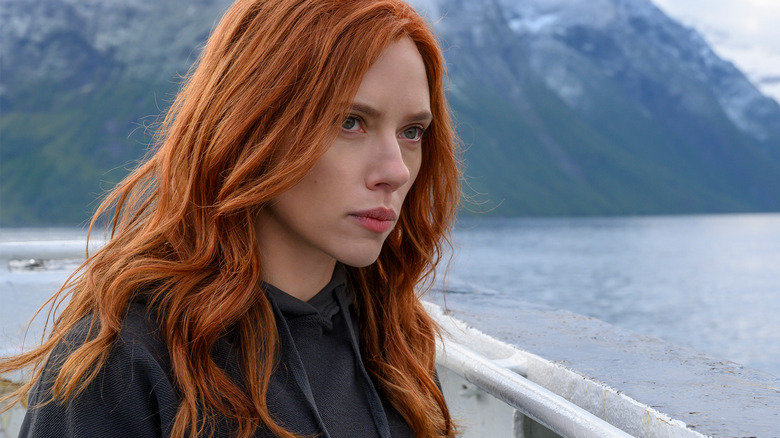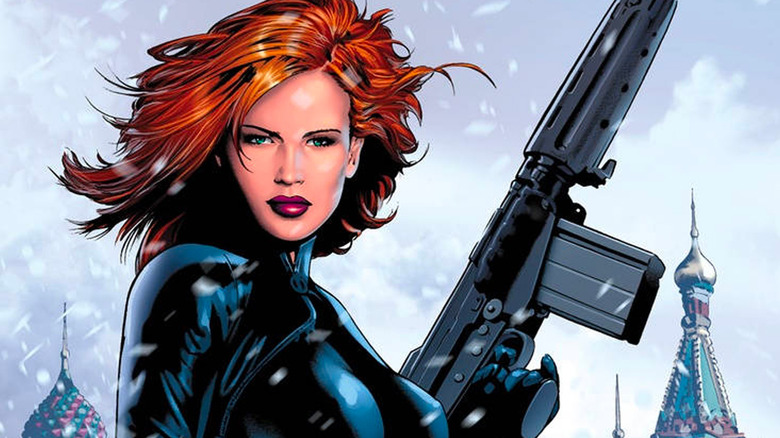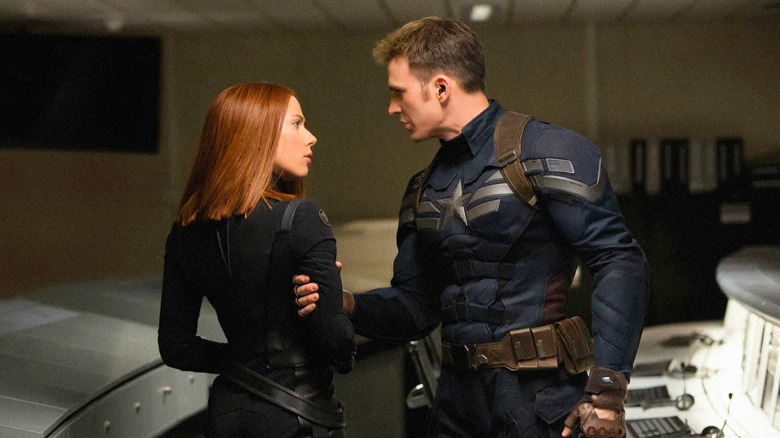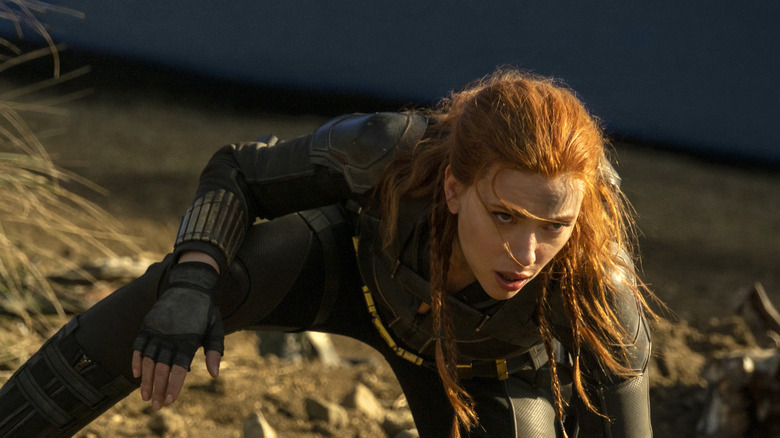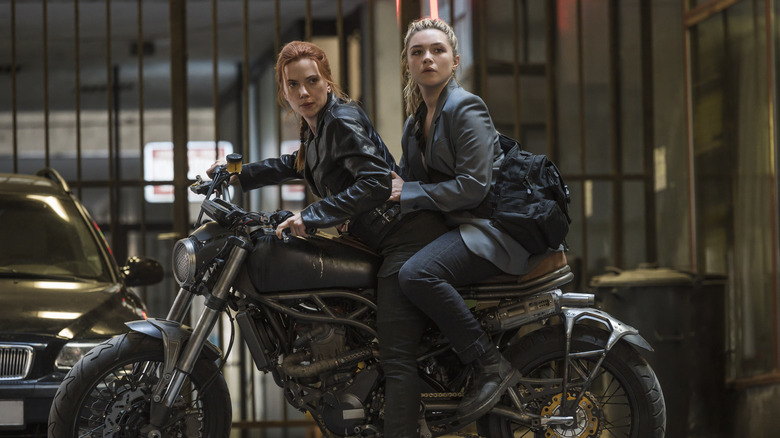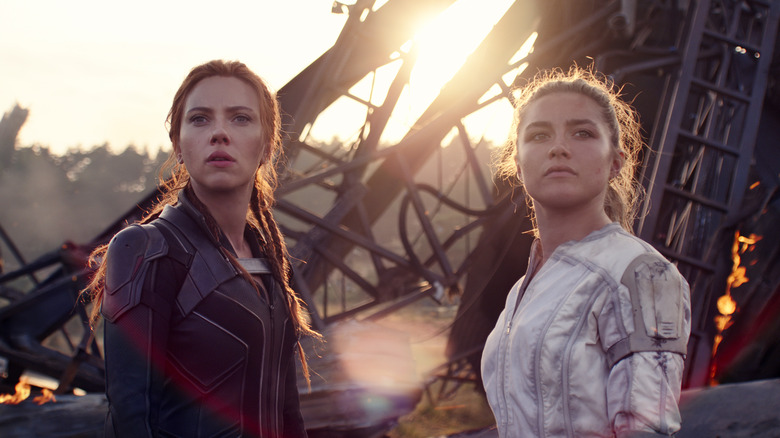Why It Took Over A Decade For Black Widow To Get Her Own MCU Movie
Black Widow's track record in the Marvel Cinematic Universe hasn't always been flawless. The highs ("Captain America: The Winter Soldier") were certainly high, but the lows ("Avengers: Age of Ultron") were just as low. Still, the operative otherwise known as Natasha Romanoff was always the MCU's secret weapon. She practically ran away with every film she appeared in, and for a large part of the franchise's initial run, she was one of the few female characters making a consistent impact. But as Johansson continued to turn in solid supporting performances, it was hard to ignore the fact that she'd yet to get a chance to stand on her own.
By the time Marvel finally delivered a solo Black Widow project, it felt like way too little, too late. "Black Widow" found itself somewhere in the middle of the franchise's 15-year output: it did its title character justice, in a way, but it wasn't exactly worth the wait either. It didn't help that the film came hot on the heels of Natasha's shocking sacrifice in "Avengers: Endgame," perhaps as a conciliation prize for over a decade of demand for more female-centered stories.
"Black Widow" was only the second MCU film to feature a female lead after 2019's "Captain Marvel." Why exactly did it take so long for Marvel to give the people what they want; to recognize that the future is, in fact, female? The answer is tangled in a whole lot of red tape, but the behind-the-scenes book "MCU: The Reign of Marvel Studios" boils down years of conflict to one pervasive issue: the obstinance of former Marvel CEO Ike Perlmutter.
A tentative start
A Black Widow movie had been a topic of discussion even before the formation of the MCU. Conversations were taking place as far back as 2004 when Lionsgate optioned the rights to adapt the character in a feature film. Back then, Black Widow was considered the easiest Marvel character to bring to the big screen: there was already a precedent for spy films with the rise of Jason Bourne and his gritty, jet-setting contemporaries.
"X-Men" screenwriter David Hayter had been tapped to write and direct for Lionsgate — but whatever progress he made was halted by a new wave of ill-received action vehicles. "Unfortunately, as I was coming up on the final draft, a number of female vigilante movies came out," Hayter told the "MCU" authors. Some — like "Tomb Raider," "Underworld" and "Kill Bill" — were bankable hits. Others, however, weren't so lucky. After the less-than-auspicious release of the Charlize Theron-led "Æon Flux," Lionsgate pulled the plug on its Black Widow movie.
"'Æon Flux' didn't open well," Hayter recalled. "And three days after it opened the studio said, 'We don't think it's time to do this movie.'"
Hayter went on to develop Zack Snyder's "Watchmen" and Netflix's "Warrior Nun," but still looks back with regret on Lionsgate's canceled plans. "I accepted their logic in terms of the saturation of the marketplace, but it was pretty painful," he continued. "I had not only invested a lot of time in that movie, but I had also named my daughter, who was born in that time period, Natasha."
Designing Natasha
When Black Widow made her MCU debut in "Iron Man 2," Hollywood was still acclimating to the idea of a female-fronted superhero film. Fans seemed to want a solo Black Widow film right off the bat, but Marvel and its notoriously meddlesome Creative Committee remained lukewarm to the idea.
Johannson, meanwhile, was working hard to prime Black Widow for an imminent solo film. With the help of Joss Whedon, Nastaha's appearance in "The Avengers" felt much more grounded and nuanced. "Joss Whedon and I talked about her past," Johansson said. "Who is she? How does she get to be a mercenary? What path do you follow in order to get to that place? We both wanted to see the darker side of her — why did she have to learn those skills?"
Johansson's conversations with Whedon would lay the groundwork for Natasha's long-gestating solo film. "The Avengers" established her strong relationship with fellow Avenger Clint Barton, spun a compelling tale of her time before S.H.I.E.L.D., and reintroduced her as an operative with her own agenda. Johansson seemed much more at home in the role, which only made her performance that much more captivating. Natasha was holding her own with a handful of superpowered men. But that, in turn, raised an "obvious question": if Thor, Captain America, and Iron Man got to continue their arcs in their own films, why couldn't Black Widow?
Trouble in the toy aisle
As years passed, Marvel continued to drag its feet on a solo Black Widow movie. "There's no definitive plans," Kevin Feige said in 2011. "But we have started talking, and talking with Scarlett, about what a Widow movie could be."
But despite Feige's claims of progress, Marvel seemed no closer to greenlighting a Black Widow film. At the end of the day, the argument kept circling back to merchandise sales. "Toymakers will tell you [female heroes] won't sell enough," Whedon said in 2013. And given that the head of Marvel at the time, Ike Perlmutter, had made his name in the toy business, he had no problem clinging to that philosophy. For years, Black Widow action figures were conspicuously missing from toy shelves. The same goes for the female characters that followed in her footsteps, like Zoe Saldaña's Gamora from "Guardians of the Galaxy."
Things seemed to come to a head in 2015 when IndieWire's "Women and Film" blog uncovered an email sent from Perlmutter to a Sony executive. The message was brief, containing a short list of female-led superhero movies and their respective box office takeaways. Perlmutter cited "Catwoman" and "Elektra" as financial disasters, likely to discourage Sony from investing in a female action hero. (In 2014, Sony had announced its plans to develop a female-centered story for the Spider-Man Universe — just days before Perlmutter sent his email to Sony's Michael Lynton.)
Kevin Feige's last straw
By the time Perlmutter's email was leaked to the public, the outcry had reached its zenith. Female fans seemed more visible than ever, but female heroes continued to be sidelined in the MCU. It wasn't just Black Widow; fans were also disappointed in Marvel's decision to exclude the Wasp from "The Avengers," despite her being a founding member of the supergroup in the comics. Though she'd later appear in "Ant-Man," the 2015 film didn't do quite enough with her character. "Guardians of the Galaxy," meanwhile, had pulled a large female audience in its theatrical run (more than 40% of the audience was female). Change was certainly in the air, but Marvel remained unmoved by it.
Even Marvel head Kevin Feige had seemingly had enough and all-but-directly addressed Perlmutter's emails in a 2014 interview with Comic Book Resources. "I very much believe that it's unfair to say, 'People don't want to see movies with female heroes,' then list five movies that were not very good," he said. "And they don't mention 'Hunger Games,' 'Frozen,' 'Divergent.' You can go back to 'Kill Bill' or 'Aliens.' These are all female-led movies. It can certainly be done."
Feige's "unusually blunt criticism" of Perlmutter and the Creative Committee was one sign of his efforts behind the scenes. In 2017, Vanity Fair reported that Perlmutter had been "quietly sidelined" in "a long-overdue" management restructuring at Disney. Sources close to Marvel cited Perlmutter's "outdated opinions about casting, budgeting, and merchandising" — as well as his financial support of then-President Donald Trump — for the studio's switch in leadership.
The next generation
Once Feige was promoted to Chief Creative Officer, the MCU immediately pivoted to make its projects more inclusive. With films like "Black Panther" and "Captain Marvel," the franchise was finally beginning to mirror its audience. Those efforts paved the way for "Black Widow" to finally bow in 2021 — but even with all that red tape finally cleared, the film would have its own set of problems.
Still, for all that frustration, at least we know why it took so long to get more women-centered films off the ground. Marvel has since introduced a handful of powerful female heroes, all of whom owe some measure of debt to Black Widow, and to Johannson. It is, of course, a shame that she never got to truly enjoy the fruits of her labor: with Natasha's death in "Endgame," the MCU lost one of its most nuanced characters. "Black Widow" proved that she still had plenty to give, all while offering a brief glimpse into the sort of blockbuster vehicles that fans (and actors) have been denied for years.
Alas, such is the nature of a trailblazer. Marvel is still grappling with a new set of issues in its latest phase, but with Florence Pugh's Yelena Belova, it's safe to say that the Black Widow mantle is in good hands. Hopefully, we won't have to wait another 10 years to see her solo vehicle.
